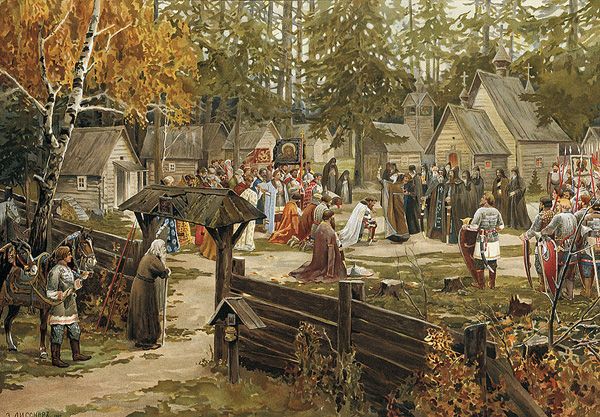|
Course unit code
|
|
|
Course unit title
|
Introduction to Medieval Russian Culture
|
|
Name(s), surname(s) and title of lecturer(s)
|
Zheravina Olga Alexandrovna
|
|
Level of course
|
B
|
|
Semester
|
2
|
|
ECTS credits
|
1
|
|
Working hours
|
Contact hours 18
|
|
|
Self-study 18
|
|
|
Total 36
|
|
|
Work placement
|
-
|
|
|
Prerequisites
|
Students will be required to attend not less than 90% of classes
|
|
|
Language of instruction
|
English
|
|
|
Objectives of the course
|
Learning outcomes
Upon the completion of the course, students should be able to:
|
A student’s assessments methods
|
|
To introduce a comprehensive overview of key cultural phenomena in medieval Russia, demonstrating genesis, development and value of national culture.
To provide students with an appropriate grounding for exploring specific aspects in Russian culture.
To awaken interest in the Russian culture and motivation to continue its studying independently
|
Understand the general trends of medieval Russian culture.
Establish and describe essential historical phenomena defined cultural development of Old Rus.
Comprehend semantics and value of works of medieval Russian art.
|
Writing reflections
Wrappers (a set of reflective questions)
Presentation (as summative assessment)
|
|
Teaching methods
|
Extensive resources will include PowerPoint presentations; seminar discussion questions; copies of and/or links to required readings and audio-visual materials; and supplementary materials to aid students in preparing for assessment.
|
|
|
Course unit content
|
Course objective –
Gained knowledge and skills –
|
|
List of Topics
|
Topic title
|
Contact
hours
|
Assignments and independent study hours
|
|
Paganism in Ancient Rus’ and its role in Russian culture
|
2
|
2
|
|
The Christianization of Rus’.
|
2
|
2
|
|
Influence of Byzantine culture to Kievan Rus.
|
2
|
2
|
|
|
The St. Sophia Cathedral in Kiev as a masterpiece of the Russian ancient culture.
|
2
|
2
|
|
|
Architecture of Kiev, Vladimir, and Novgorod.
|
2
|
2
|
|
|
Russian Icon Painting. How to Read an Icon.
|
2
|
2
|
|
|
Andrei Rublev, a famous medieval painter of orthodox icons.
|
2
|
2
|
|
|
Art and Architecture of Muscovite Rus.
|
2
|
2
|
|
|
Genres of Early Russian Literature.
|
2
|
2
|
|
Assessment requirements
|
To prepare presentation
To attend classes
|
|
Assessment criteria
|
The presentation is well organized
The classes are attended
|
|
The composition of final accumulative mark
|
Presentation 40%
Attendance 60%
|
|
Author of the course
|
Zheravina Olga A.
|

.png)